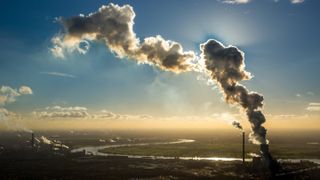Breach of key global warming threshold 'inevitable' as carbon emissions hit record high
At the current emissions level, there is a 50% chance that global warming will exceed 1.5 degrees Celsius consistently in about seven years, new research suggests.

Global carbon emissions from fossil fuels have risen to yet another record high in 2023, leading scientists to warn that it now appears "inevitable" that global warming will exceed the dangerous threshold of 2.7 degrees Fahrenheit (1.5 degrees Celsius) above preindustrial levels.
Humanity released 40.6 billion tons (36.8 billion metric tons) of carbon dioxide into the atmosphere in 2023, representing an increase of 1.1% from 2022, according to a new report by an international team of climate scientists.
When added to the emissions created by land-use changes, including deforestation, a total of 45.1 billion tons (40.9 billion metric tons) of carbon dioxide was emitted in 2023. At the current emissions level, the researchers estimate a 50% chance that global warming will exceed 1.5 C consistently in about seven years.
Related: Michael Mann: Yes, we can still stop the worst effects of climate change. Here's why.
Released on the fifth day of the United Nations Climate Change Conference of the Parties (COP28) in Dubai, the Global Carbon Budget report highlights the urgent need for rapid decarbonization in a year that has already seen record-breaking temperatures, extreme melting events, and predictions of vital ocean currents collapsing from just 2.2 F (1.2 C) of heating.
However, in their findings, published Dec. 5 in the journal Earth System Science Data, the report's authors highlight that the gap between the promises made by governments, investors and companies and their actions remains far too wide.
"The impacts of climate change are evident all around us, but action to reduce carbon emissions from fossil fuels remains painfully slow," lead author Pierre Friedlingstein, a professor of climate science at Exeter University in the U.K., said in a statement. "It now looks inevitable we will overshoot the 1.5C target of the Paris Agreement, and leaders meeting at COP28 will have to agree to rapid cuts in fossil fuel emissions even to keep the 2°C target alive."
The report shows that emissions from oil and gas are set to rise by 1.5% and 0.5%, respectively, this year, while emissions from coal, once thought to have peaked in 2014, will climb by 1.1% to a new record high. Emissions are predicted to increase in India by 8.2% and in China by 4% while decreasing in the European Union by7.4% and the U.S. by 3%. The rest of the world's emissions will decrease by 0.4%.
To achieve the Paris Agreement target, global greenhouse gas emissions must plummet by 45% by 2030 and be slashed to net zero by midcentury. Roughly half of greenhouse gas emissions released into the atmosphere are absorbed by ocean and land sinks, yet to achieve net-zero emissions, longer-term solutions, like widespread carbon capture, will also be needed, according to the U.N.'s Intergovernmental Panel on Climate Change (IPCC).
However, these technologies face significant environmental, economic and technological barriers that could limit their viability. Excluding nature-based methods, such as reforestation, current carbon-capture technologies removed about 0.011 million tons (0.010 million metric tons) of carbon dioxide from the total in 2022 — roughly 4 million times smaller than current yearly emissions.
So far, the only scaled-up carbon-capture methods are those of reforestation, improved forest management and carbon sequestration in soil. But the carbon stored by these mechanisms is prone to sudden release through forest fires and the human demand for resources, both of which could be exacerbated by climate breakdown, according to the IPCC.
"The latest CO2 data shows that current efforts are not profound or widespread enough to put global emissions on a downward trajectory towards Net Zero, but some trends in emissions are beginning to budge, showing climate policies can be effective," Corinne Le Quéré, a professor of climate science at the University of East Anglia in the U.K., said in the statement.
"All countries need to decarbonise their economies faster than they are at present to avoid the worst impacts of climate change," Le Quéré said.
Live Science newsletter
Stay up to date on the latest science news by signing up for our Essentials newsletter.

Ben Turner is a U.K. based staff writer at Live Science. He covers physics and astronomy, among other topics like tech and climate change. He graduated from University College London with a degree in particle physics before training as a journalist. When he's not writing, Ben enjoys reading literature, playing the guitar and embarrassing himself with chess.
Most Popular

By Harry Baker